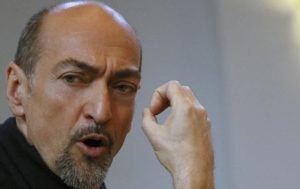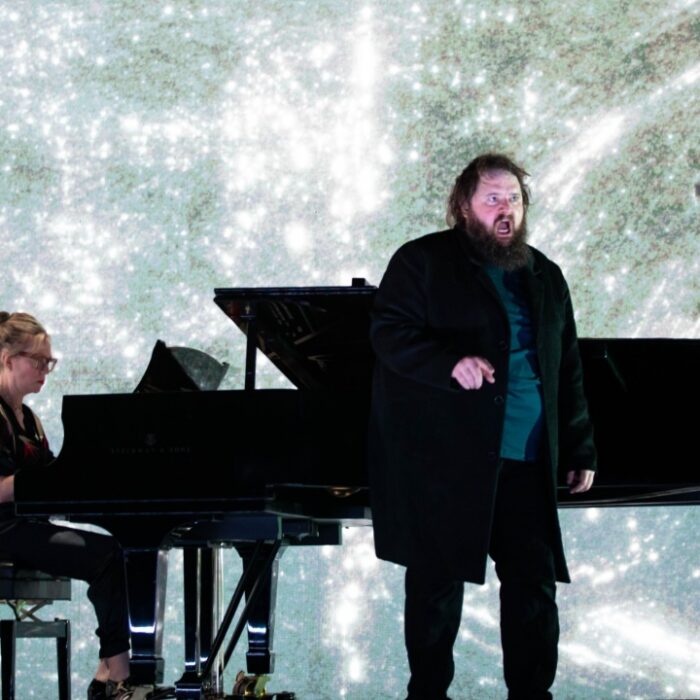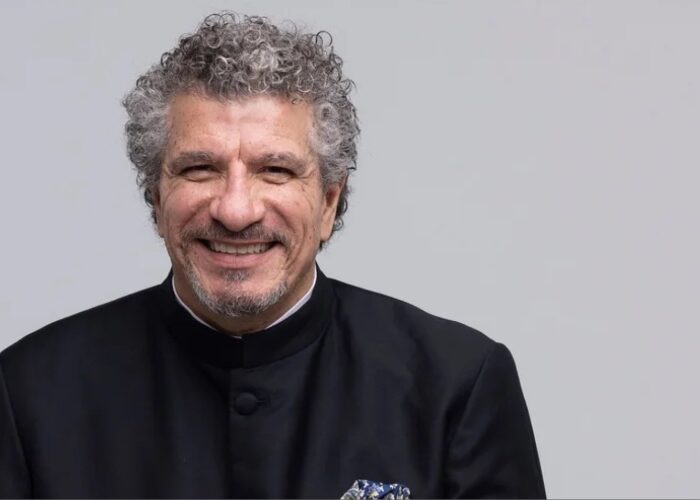
Q & A: Alessandro De Marchi on the Innsbruck Festival For Early Music
By Alan NeilsonEach summer, Innsbruck hosts its Festival for Early Music. Established in 1976, it specializes in presenting historically informed performances of early music, including operas, many of which have not been heard for hundreds of years. Currently it is under the artistic direction of the early music specialist, Alessandro De Marchi, who has been in the post since 2010. Over the past 25 years de Marchi has built an established reputation in the fields of early music and bel canto, with a passionate interest in lesser-known works. He is in constant demand from prestigious opera houses and concert halls throughout Europe, and has made numerous successful recordings, including “La Sonnambula” with Cecilia Bartoli and Juan Diego Flórez, and a disc of Handel arias with Sonya Yoncheva.
OperaWire managed to catch up with de Marchi during his busy schedule, as he was passing through Turin, on his way to Innsbruck to prepare for this year’s festival.
OperaWire: You are a specialist in the early music field. What is it about the genre that first attracted you?
Alessandro De Marchi: It was at a time when I was a student in Rome, at the conservatory, and I was playing jazz regularly. I had learned in the conservatory how to improvise chords and basso continuo. I discovered that with this ability you can play baroque music, because it has this as its base. I then discovered people at the Chiesa Valdese in Rome, who were playing baroque regularly, and I just joined them. That was the start, so in a way, it was improvisation which proved to be my gateway to the repertoire.
OW: Was your aim always to become a conductor?
ADM: Absolutely not, it was mainly by chance that I became a conductor. When at the conservatory, I was asked to conduct a performance, but it was not a serious career decision, and I didn’t take it further, but people said I had done it well. Then when I was working in Berlin at the Staatsoper I was asked to take a piano rehearsal as there was nobody else available. Daniel Barenboim came in, and watched me intensely for maybe 30 minutes, after which he asked me if had thought of becoming a conductor. Then later, after watching me conduct with a full orchestra, his opinion was that “there were worse.” Twenty years later he sent me a text, after seeing one of my performances. It read “molto bene.”
OW: To many people who first encounter operas of the 17th and 18th centuries, most notably form the baroque period, they can appear strangely distant and difficult to relate to. Do you think they have anything to offer a modern audience beyond, of course, the fabulous music and wonderful singing?
ADM: Yes. I don’t think that over the centuries the basic feelings of people have changed. Baroque music was composed in a specific way, in order to move the emotions of the audience, and so that is why it will always be modern: people don t change.
OW: Obviously, the state of the scores from early works vary considerably. How do you go about reconstructing the work for a performance?
ADM: So at the base is the Ur-text, which I use to reconstruct the original text. Then my job is to imagine everything they did, but which isn’t included in the score, which is about 90 percent. That is what I do. A part of it I write down with a pencil, and part of it I discuss verbally with the performers. Some of the musicians and singers can also improvise and propose things, and so they also have an involvement.
OW: What sort of performance are you aiming to create? Are you aiming, for example, at attaining something which you see as being as close as possible to the original, or do you factor in modern tastes?
ADM: It is a mixture of both. First of all you have to realize that it isn’t possible to make a complete reconstruction, because we don’t know enough about it. And the second thing is that not everything they did would be acceptable for us today. For example the audience spoke during the recitatives, and played cards and even had sex during the opera. I don’t think we want that today.
OW: You have been Artistic Director of the Innsbruck Festival of Early Music since 2010. How do you view your tenure, and what new ideas have you brought to the festival?
ADM: I actually started in September in 2009, but I have been working on the programs since 2010. Of course, we have continued to do a lot of traditional work, for example on discovering new operas and developing a new repertoire of works which have never been done before. But we also had new ideas, for example the “open mind concert” in which we invite people to do crossover, with baroque music. I introduced the Cesti competition, which was a very important development, and of course, I also established the “Barokoper jung” productions, an opera which is performed by the finalists from the previous year’s Cesti competition. We also now do a lot of small intermezzi in semi-staged productions in the castle, and although this year we are not doing them, in the past we have done a lot, including Bach’s “Kaffeekantate” and Pergolesi’s “La Serva Padrona.” It is a very nice experience because the audience is very close to the singers.
OW: What is the theme for this year’s festival?
ADM: The general theme is, “moving worlds” or “changing worlds.” This is the general idea, but it includes many secondary ideas. One of them being the violin maker, Steiner, who was from the Tyrol, and many of the best violinists of the 18th century had violins made by him. Many people of that era said they were better than Stradivarius. And of course there is a theme for the three operas – we have three heroines, and it is this which forms the connection between them.
OW: Many people prefer early operas to be performed in intimate surroundings, such as a church or a small theatre. You are doing three operas in Innsbruck this August, in two different venues, and the Cesti competition takes place in a third venue. How important for you, and in what ways, is the venue, and how do you rate the venues in Innsbruck?
ADM: We don’t have a baroque theater in Innsbruck, so we don’t have exactly the right theatre for performing baroque works, but I think it is more important to have a theatre which has all the things you need for a production, and of course, when I think of some baroque theatres, like the San Carlo in Napoli, they are very big, bigger than the theater we have here in Innsbruck, the Landestheater, so the size is not so important. Obviously, for smaller operas it is preferable to have a smaller theatre, and we do this for the “opera young” productions, which take place outside in the Theologische Fakultaet.
OW: What period do you define as constituting early music? I ask this because you have moved further towards the 19th century than previous directors of the festival, for example with Mozart’s “La Clemenza di Tito,” and now this year with Mercadante’s “Didone Abbandonata.”
ADM: If you say “early music” then it is a little different, but if you say “ancient music,” I say any music that has not just been composed is old! But here in Innsbruck we limit it to works composed up to 1830.
OW: Specifically, what are the characteristics of “Didone Abbandonata” which make the work suitable for this festival?
ADM: The important link is the libretto, because it is one of the best, and one of the most used of Metastasios’ libretti. This opera was composed during the period when Metastastio’s libretti were still being used for operas, although the musical forms had been modernized by this time; the operas of 1820s needed certain structures, with finales, with finale primo, choruses and ensemble music – the text for the recitatives was used for theses scenes. Then there is the instruments which were different from modern instruments, and we will use original instruments for the performances.
OW: Would you like to say something about the other two operas at this year’s festival, Hasse’s “Semele” and Cavalli’s “Gli amori d’Apollo e Dafne”?
ADM: In both cases, they are very rare operas. “Semele” is a serenata composed by Hasse for Napoli. It is a small opera, in just two parts with only a few soloists and just strings in the orchestra. It also has some extremely beautiful music, although very challenging for the singers, and a beautiful story. It is an opera that has not been performed since its premier in Naples. “Gli amori d’Apollo e Dafne” by Cavalli is one of the most beautiful operas of the 17th century, and I can only say, “just come!”
OW: What was your rationale for introducing the Cesti competition? Was it primarily an artistic decision, or a way to increase the festival’s profile or simply to aid young singers?
ADM: I wanted to give young singers the chance, the possibility, to sing in front of a highly qualified jury, and so in our jury we include the artistic director, the casting director and many others, people who can help the careers of these young people. At the same time, I wanted to be able to have a look at the best emerging young singers in the current year. Many of the singers have gone on to achieve great success, and many are regularly invited back to the festival. So, overall I am very happy with it, in fact, absolutely happy with it!
OW: You have already achieved a lot in your career, so what ambitions do you still hold for the festival, and for yourself personally?
ADM: I want the festival to continue in the same direction. I would like to continue to have the possibility of experimenting with new repertoire, without of course, the fear that the audience will stop coming. On a personal level, I want to continue to develop my repertoire: I don’t won’t to finish my career without ever having conducted Verdi or Puccini.


